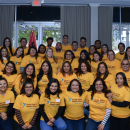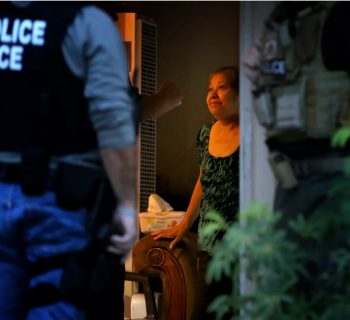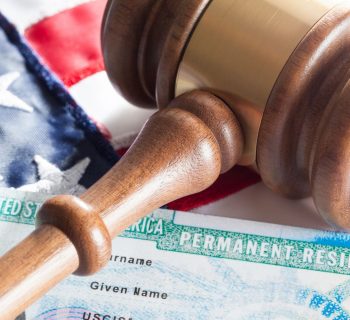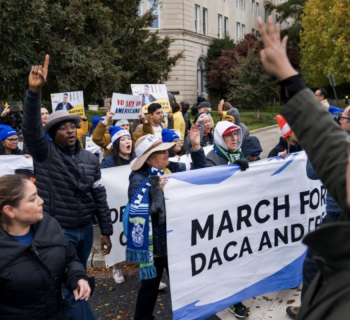By: Itzel Hernandez~ AFCS ~ November 1, 2019
AFCS organizer Itzel Hernandez shares her DACA story- and why she and many other DACA recipients are demanding congress stand up for all immigrants.
I didn’t know I was undocumented until I was a senior in high school. My parents told me the news when I started applying for college. My status meant I couldn’t qualify for financial aid, putting my dream of going to a four-year university all but out of reach.
The realization left me feeling defeated. I had moved to the U.S. from Mexico with my mom when I was ten years old so we could reunite with my dad, who had arrived years prior. I worked hard in school and felt I had done everything I could to set myself up for college—but it was all for nothing.
All of that changed in 2012 when President Obama created Deferred Action for Childhood Arrivals, better known as DACA for people who came to the U.S. as children. The program protects recipients from deportation, allowing us to work and pursue educational opportunities.
I remember the night my mom and I watched President Obama making the announcement on television from the Rose Garden. I felt the way someone does when their numbers are called in the lotto. Can I really have this? It was emotional, imagining all the possibilities.
Since then, DACA has helped me earn a college degree and have access to jobs that wouldn’t have otherwise been available to me. For more than a year, I’ve had the privilege of working as an immigrant rights organizer with AFSC in my community of Red Bank and nearby areas in central New Jersey.
Now the Trump administration is trying to end this vital program. In 2017, the administration announced that it would terminate DACA, upending the lives of many young people, their families, and communities.
On Nov. 12, the Supreme Court will hear arguments over whether the termination was lawful, and might even consider whether the creation of DACA was lawful--and its decision will have enormous consequences. If the court decides against DACA recipients, hundreds of thousands of young people will lose their ability to live and work in the U.S. lawfully.
But we are ready for whatever happens next.
Since 2017, DACA recipients and allies have organized to push back against the Trump administration’s attacks on the program–as well as its aggressive efforts to deport millions of other immigrants who are part of our communities.
Every year in New Jersey, an estimated 4,000 undocumented students graduate from high school. My work includes reaching them before they apply for college, making sure they know their rights, have access to services, and understand the educational and job opportunities available to them. For instance, New Jersey now offers financial aid for undocumented students and DACA recipients. However, they’re still barred from working as nurses or full-fledged teachers–anything that requires state licensing.
We’ve also provided a place where students can come together to create a community. Once you find out your immigration status, it can be the loneliest thing thinking no one else is like you. I’ve talked with people I grew up with who I had no idea were going through the same thing that I was.
Right now, we have about 40 students from immigrant families who come together to share their experiences and organize. Students have given presentations on DACA at local libraries and colleges and led discussions for other groups of students. They have traveled to Washington, D.C. to lobby their representatives. I can tell you there is nothing that feels more powerful than to be able to tell your own story face to face with someone. When you have a 16-year-old in front of you, telling you, “I am scared,” it is powerful for the person listening to the story, but even more so for the person saying it. It’s invigorating to know these young people will be leading our generation and the ones to follow.
On Nov. 12, many of us will join DACA recipients and allies from across the country in Washington, D.C. for mass action on the courthouse steps. But no matter what the court’s decision is, it’s important to remember that only legislation–not litigation–will provide a permanent solution for DACA recipients and other immigrants under attack by this administration.
And we don’t just want protection for DACA recipients. Congress must pass legislation to provide a roadmap to citizenship for all 11 million undocumented people living and working in the United States.
I am not any more deserving of protection than anyone else. Our parents and all members of our communities also deserve protections. We all deserve to know that we can feel secure in continuing to build our lives here.
I sometimes think back on my experience learning I was undocumented and how defeated I felt. It took me a while to work through that feeling and understand the reason my parents kept it from me was only out of love. My mom told me, “If we had told you, you would never have dared to dream what you dream.”
She was right. My parents let me dream beyond my wildest dreams by not letting me know my limitations. Every person should have the same opportunity.
Take action today! Tell your Senator to protect DACA recipients and call for humane immigration policies that respect the rights and dignity of all people.
Source: Itzel Hernandez~ AFCS ~ November 1, 2019







